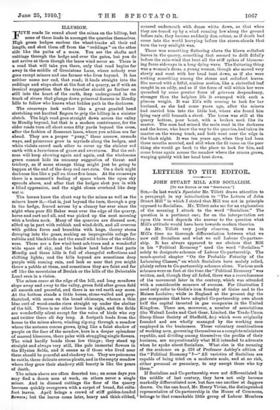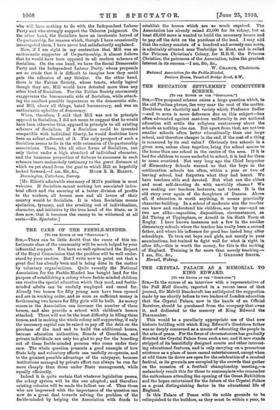LETTERS TO THE EDITOR.
JOHN STUART MILL AND SOCIALIS1L
[To rim Eorros or TIM " sracmrca.1 SIR,—In last week's Spectator Mr. Tillett draws attention to a paragraph in my introduction to "The Letters of John Stuart Mill " in which I stated that Mill was not in principle opposed to Socialism. Mr. Tillett asks me for an explanation of the meaning I attach to the word " Socialism." The question is a pertinent one ; for on the interpretation set upon this word depends the answer to the question what Mill's attitude would have been towards modern theories.
As Mr. Tillett very justly observes, there was in Mill's time no thorough differentiation between what we now call Socialism and what we call Labour Co-partner- ship. It has always appeared to me obvious that Mill in his "Political Economy" used the word " Socialism " solely to designate schemes of Labour Co-partnership. The much-quoted chapter "On the Probable Futurity of the Labouring Classes," on which Socialists have mainly relied, plainly refers to Co-partnership schemes alone. Various such schemes were on foot at the time the "Political Economy " was written, and, though they all failed, there was a recrudescence of the movement later in the century, which was attended with a considerable measure of success. For illustration I need only refer to Godin's iron foundry at Guise and to the Maison Leclaire ; while in England at the present day the gas companies that have adopted Co-partnership own about half the capital invested in gas companies in the United Kingdom. There are, moreover, a number of associations (the Walsall Locks and Cart Gear, Limited, the Trade-Union Sheep Shear Society of Sheffield, &c.) which were originally founded and are wholly managed by the working men employed in the businesses. These voluntary combinations of working men, governing themselves as a complete miniature republic, and dividing among themselves the profits of their business, are unquestionably what Mill intended to advocate when he spoke about Socialism. What else is the meaning of the sentence on p. 216 of Professor Ashley's edition of the "Political Economy" ?—" All varieties of Socialism are capable of being tried on a moderate scale, and at no risk, either personal or pecuniary, to any except those who try them."
If Socialism and Co-partnership were not differentiated in the middle of last century, they have not only become markedly differentiated now, but face one another at daggers drawn. On the one hand, Mr. Henry Vivian, the distinguished representative of Co-partnership in the House of Commons, belongs to that remarkable little group of Labour Members who will have nothing to do with the Independent Labour Party and who strongly support the Osborne judgment. On the other hand, the Socialists have an inveterate hatred of Co-partnership, for reasons which, though I have occasionally interrogated them, I have never had satisfactorily explained.
Now, if I am right in my contention that Mill was an enthusiastic supporter of Co-partnership, it almost follows that he would have been opposed to all modern schemes of Socialism. On the one hand, we have the Social Democratic Party and the Independent Labour Party, whose proposals are so crude that it is difficult to imagine how they could gain the adhesion of any thinker. On the other hand, there is the Fabian Society, whose tenets, wholly logical though they are, Mill would have detested more than any other kind of Socialism. For the Fabian Society enormously exaggerates the bureaucratic side of Socialism, while attach- ing the smallest possible importance to the democratic side; and Mill, above all things, hated bureaucracy, and was an enthusiastic upholder of democracy.
When, therefore, I said that Mill was not in principle opposed to Socialism, I did not mean to suggest that he would have been otherwise than opposed in principle to all existing schemes of Socialism. If a Socialism could be invented compatible with individual liberty, he would doubtless have been an ardent adherent of it. The only prospect of such a Socialism seems to lie in the wide extension of Co-partnership associations. These, like all other forms of Socialism, can only thrive under a high standard of individual character, and the immense proportion of failures to successes in such schemes bears melancholy testimony to the great distance at which we yet stand from the goal to which Mill so hopefully [Mr. Elliot's admirable summary of Mill's position is most welcome. If Socialism meant nothing but associated indus- trial effort and the securing of a better division of profits to the workers, all honest men and all lovers of their country would be Socialists. It is when Socialism means spoliation, tyranny, and the crushing out of individualism, character, and initiative by the iron hand of the State, as it does now, that it becomes the enemy to be withstood at all costs.—ED. Spectator.]























































 Previous page
Previous page